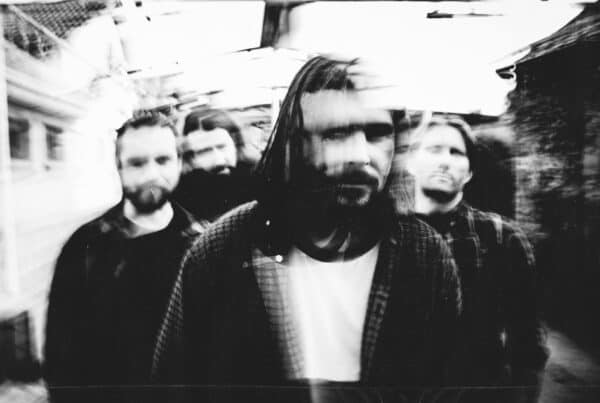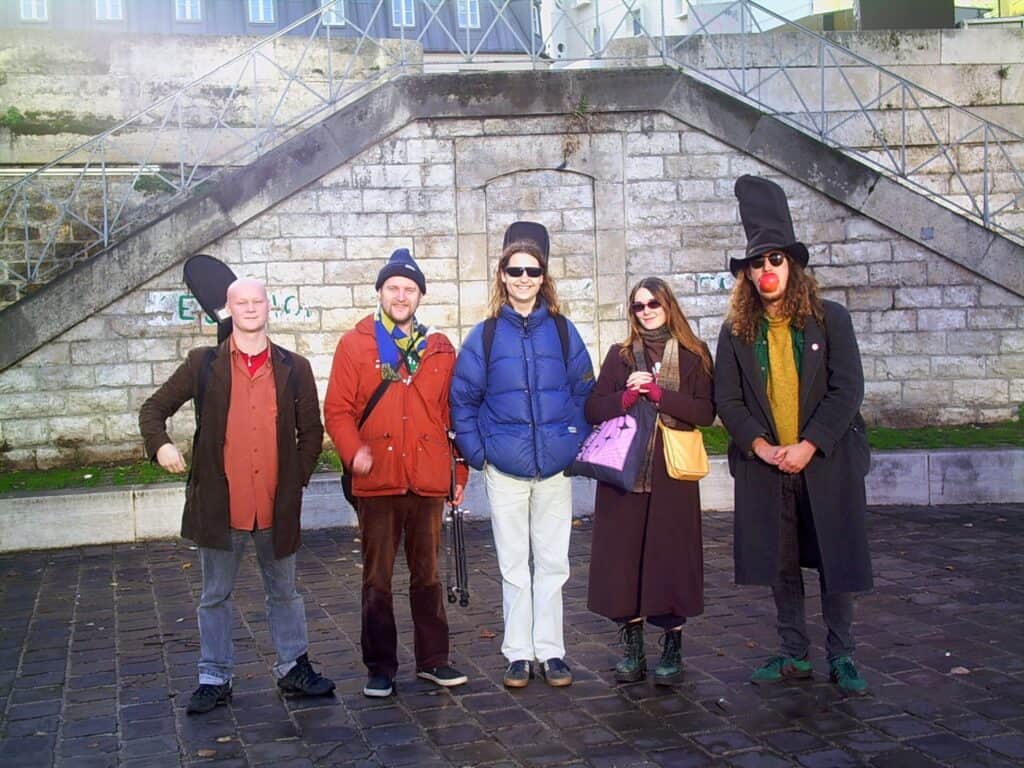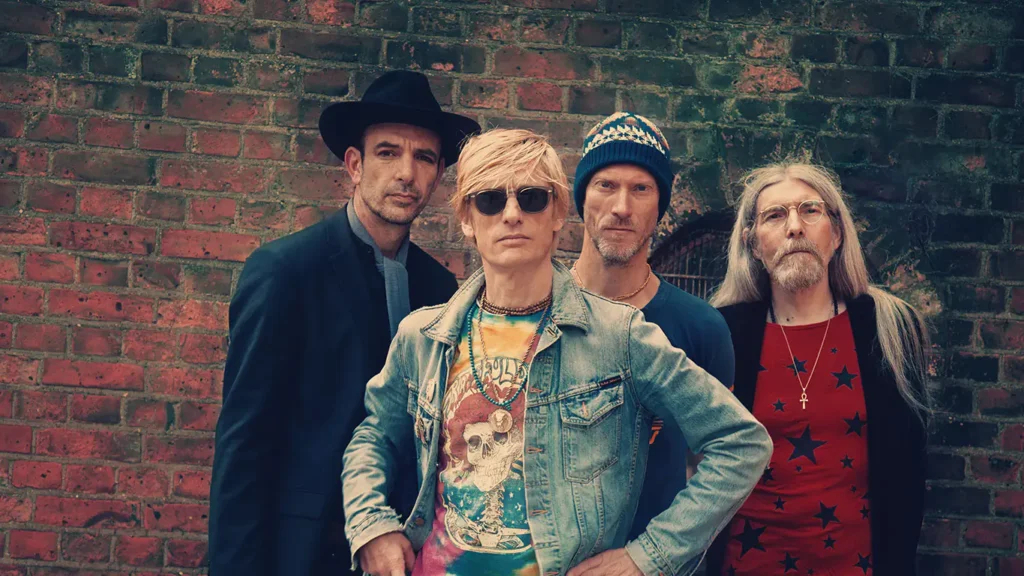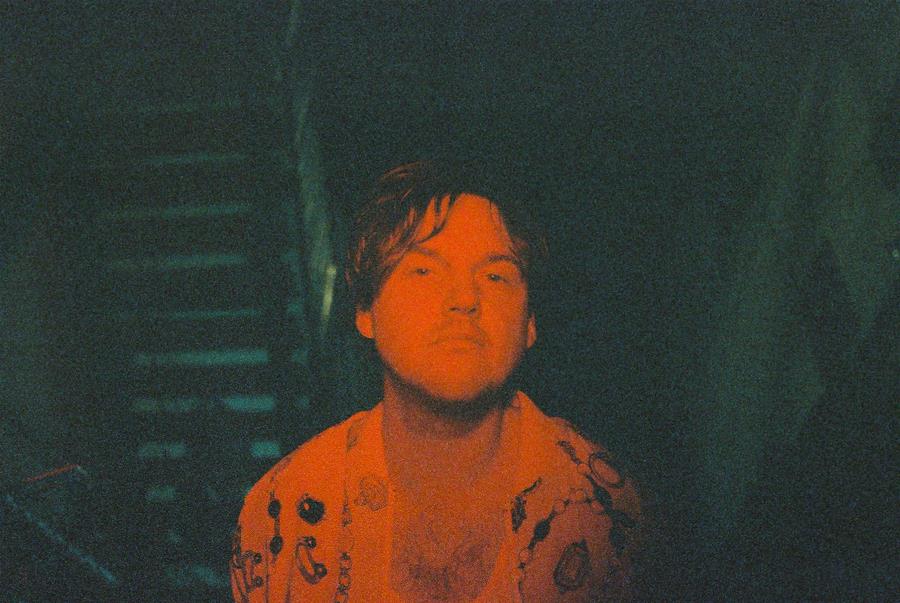On-record, Greg Obis sounds like a man possessed on the verge of a nervous breakdown. The weight of late-capitalist hellscapes mining personal pain for social media clout, economic analysis shows normalising greedy exploitation, and healthcare systems jerking around the needy piling up on top of one another. Each one pushing him further and further into acerbic hysteria over the sick joke that is life. The band soundtracking this agonised despair – bassist David Algrim, drummer Tim Green, saxophonist Sarah Clausen, and Obis himself on guitar – meet his growing paranoia with music that swings between hooky semi-detuned grooves and antic punky freakouts. Stuck are at once deadly serious about how screwed everything is right now, but also bubble-burstingly goofy and a touch twisted in their delivery, as if laughter is the only real release any of us truly have.
On Zoom, Greg is disarmingly normal. Chipper, earnest, down-to-earth. A far cry from the characters he embodies throughout Freak Frequency, Stuck’s sophomore album which we’re on the phone to go through ahead of its release. As heavy and self-parodic as that may have sounded from my earlier description, the record is actually a hell of a lot of fun. Hooks for days, energy and a loose tightness that’s thrilling to listen to, a rock-solid rhythm section driving tracks along, and a captivating voice at the centre whose delivery totally convinces every step of the way. It’s the most I’ve outright enjoyed and been excited by a post-punk record in a long time, so I was overjoyed when Greg said he was willing to hop online and take me through the album track-by-track. Read on to discover how Iceage, mix CDs, used car salesmen, neo-liberal podcasts, and a whole host of other topics influenced what will likely go down as one of 2023’s best guitar records.
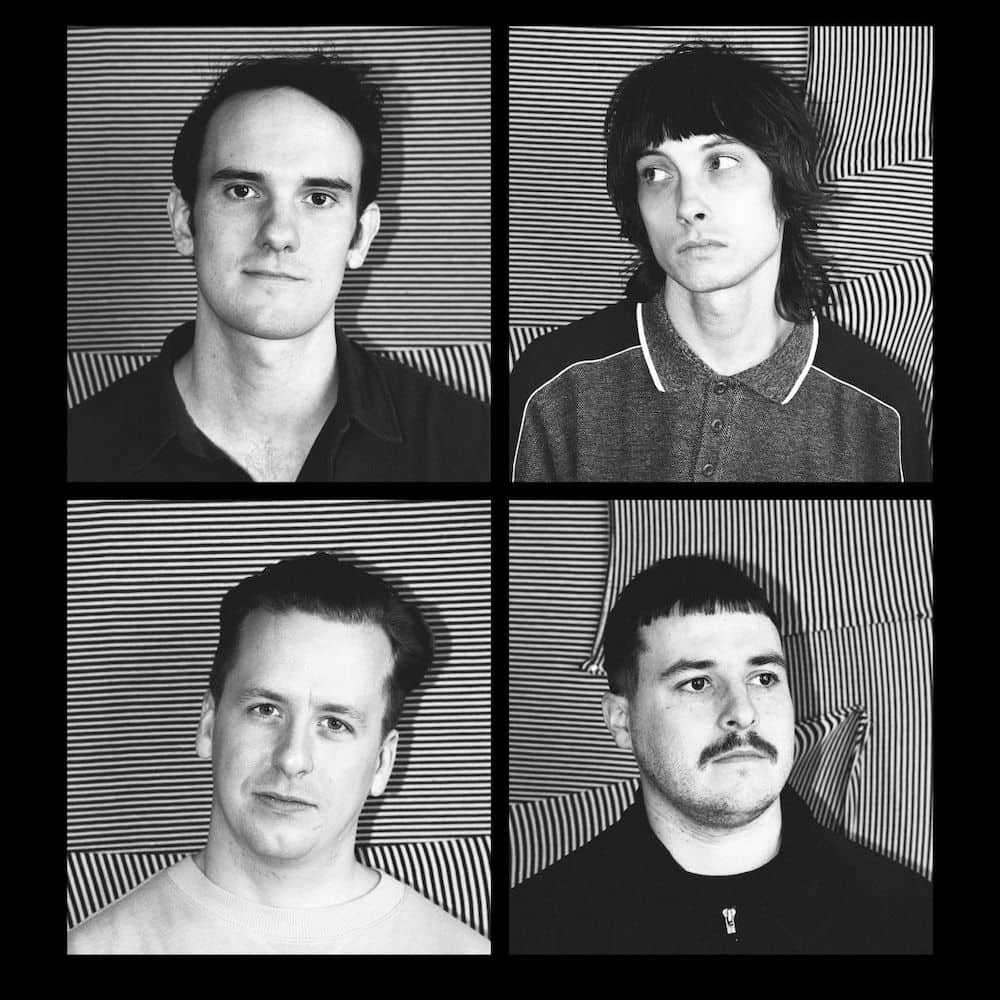
Photo by: Alexa Viscius.
The following interview has been edited for length and clarity.
1] The Punisher
It feels like an overture for the album. Musically, thematically.
Yeah, definitely. There’s this gaming term I only recently found out about called a “vertical slice.” That song has a little bit of everything on the album. A little bit of the goofiness, a little bit of the heaviness, a little of the more understated soft stuff; it covers all the bases. So, it felt like a logical place to start the record. We wrote it relatively early in the process and I think we were trying to make it the aesthetic core of the LP.
When you’re writing, where do you decide to bring Sarah [Clausen]’s saxophone in? How do you figure out what is too much or not enough sax on a song like this?
When I’m songwriting for Stuck, I’m thinking about pacing; how to withhold certain elements and introduce them slowly into the song in order to create the maximum effect. The core of a song is always gonna be two guitars, drums, bass and vocals. Anything else has to feel right.
I need to pay a lot of credit to Sarah, she really nailed it. On that song in particular, she was recording the sax before we recorded the vocals. We’d played it before, but she had a really good sense of when to be in and out, when to leave space for the vocals. She’s really well mixed in the song and a lot of that has to do with her intuition as a player.
Lyrically, it fits the overture theme by introducing how you depict these satirical bleak explorations of modern life with a mocking sneer of people who fall down QAnon holes. But, at the same time, that playful delivery masks an empathic sleight-of-hand; a sadness for the person who was lost.
I’m glad you picked up on that, it’s a big thing about that song. When we were writing that track, I listened a lot to the podcast QAnon Anonymous. While the QAnon weirdos are totally unhinged and have these fringey abhorrent views, I do think there is something inherently sad about watching these people get roped into this mindset and conspiracy. It’s not like I think these people are great people, I don’t want to apologise for them or anything. But, also, people died at the January 6th insurrection. Change is Bad, the last record, had a lot to do with death and the death cult of the US. I feel like you need at least some level of human empathy where you recognise how it’s crazy that somebody died over nothing.
2] Lose Your Cool
I really like the arpeggio guitars that come in and create an audio cue to pair with the lyrics of being stuck on a treadmill of self-sabotaging behaviour. Do you come with lyrics first to a song like this?
It’s pretty much always the song, the musical structure, first and the lyrics come afterwards. I tend to struggle with lyrics because they’re so important to me, so I put too much weight on them and it can take ages for me to figure them out. Although there are times where I go “I wanna write a song about this thing,” so we’ll record a demo and figure out how and where to apply that theme.
“Lose Your Cool” was a little more instantaneous, both parts came along around about the same time. It was more of a pandemic song, as well. These tools I had built for myself right before the pandemic, like going to therapy, just completely fell apart as soon as everything else did. My mental health is always right on the line, it feels like it could go any time without constant maintenance.
There are a lot of times on this record where a maelstrom ends up snapping into place for a cathartic chorus. Do you figure that out whilst jamming or is it already there?
It depends. Usually, I’ll write 60%-70% of the song at home, bring it to band practice, and we’ll workshop the rest together. On Change is Bad, there are about four or five songs written collaboratively. But with the EP [Content That Makes You Feel Good] and this record, it’s mostly written at home, again cos of the pandemic.
3] Time Out
That was the second-earliest thing written for the record. I was trying to see just how far I could push Tim [Green], our drummer, with his tempo. Turns out the answer was a lot! That demo was way slower than we play it on the record, it’s slower than we play it now! He’s a monster!
When I was a little kid, my older brother would make me mix CDs of various genres, and he made me one for punk. I was 11 or 12 when he gave it to me and it was filled with Operation Ivy and The Clash, stuff he was aware of rather than anything cool. I decided I didn’t like punk for a long time after that. “Time Out” is sorta the song that I thought punk was supposed to sound like when I was that age. Ludicrously fast, constantly heightening, really cathartic. That was the musical impetus.
The lyrics bounced around a lot but settled on basically being about Twitter. I’m a lot better about it these days, but I used to have this compulsive thing, and I think a lot of other people do too, where you share something online and immediately regret or delete or get into an argument with somebody over it where everybody comes out looking bad. It’s engineered to bring the worst out of people for profit. The rage economy, people making a lot of fucking money by getting mad online.
Something else I think about a lot is the last lyric of the song “nobody wants to see you win.” Sometimes I feel like, as a band, we share some good news that doesn’t get as much traction as if you say something incendiary or talk shit about somebody. I don’t think anybody wants to see you fail, but these structures are engineered to facilitate negativity in all its forms. In 2021, we booked a three-day tour to New York and back, a really quick and done thing. But the tour got cancelled because Omicron hit that week, and we didn’t know about it until we drove to Pittsburgh and then had to turn around. The post we made about having to turn around got more likes than the post announcing the tour! *laughs* It made me feel totally nuts.
4] Planet Money
After three tracks which are quite fast, we get one that has a real doomy stomp, leaves a lot of space in the mix.
I’m really glad those “Time Out” and “Planet Money” are together for that pendulum swing contrast. It was me trying to write the slowest Stuck song I could, something which grooves. We’d not done anything like it in the past, so I wanted to try my hand. It’s meant to be a massive and spacious song, going against our other instincts.
How do you go about selling a line vocally, like “the system works,” with the palpable eyeroll in the vocals?
It’s about me trying to believe them as much as I can. When I used to take singing lessons, I learned you have to embody that lyric in the moment and really believe it. That song came about from me imagining what it would be like to talk to somebody on Planet Money or a reporter for Marketplace. You hear so much stuff about these economic injustices constantly, and manufacturing consent from being told over and over “oh, this is how it’s supposed to be, this is how it works.” It just gets lost on me sometimes hearing about this constant growth and how it’s supposed to be a normal thing. This neo-liberal view of the economy only serving the top 1% of these CEOs and corporations and going “this is fine!” That song is supposed to be a little on-the-nose. Let’s talk about money and the economy and the way this is sold to us as a means to rationalise this exploitation in the most uncertain terms.
5] Freak Frequency
There are a lot of tracks here which are kinda blunt and to the point, but this one really isn’t. I struggled to figure out what I wanted to say. But, much like the rest of the record, it’s mainly about this constant escalation of paranoia, stress, and anxiety, violence… Shit stuff keeps happening, and everything’s getting worse in the US. How it’s a bad thing to be living through but, if it means we’re getting closer to things breaking and getting better from that, maybe in the long-term it’s a good thing?
What’s that pitch which keeps rising up in the right channel throughout the song?
It’s a software synth, a SEM V2 from Arturia. Any time I do things with software, I always play it through an amplifier and then record it so it sounds more like an acoustic instrument. That escalating tone is supposed to be like a shepherd’s tone – an audio trick which keeps on going up and eventually regenerates, so it’s constantly heightening and never really ends. It’s kind of an audio metaphor for the album.
6] Fools Idol
“Freak Frequency” transitions into “Fools Idol.” Were they written with the transition in mind, or did you figure that out when it came to sequencing and mixdown?
We figured that out later. Tim has the most opinions and final say on the record. He has great ideas on how best to get from one thing to another thing.
At least to my ears, David [Algrim]’s bass takes more of a lead on this one.
95% of the time, when I’m demoing at home, a song starts with drums and bass. I started playing bass when I was 10, started playing guitar when I was 15/16, and the two bands I was in before this one I played bass. So, I wouldn’t say that I’m more of a bass player than a guitar player, they’re equal in my mind, but bass playing is something I do a lot of.
7] Make it Up
That was one of the songs which was written more democratically between the four of us. Honestly, it came about cos I was trying to buy the minivan we now tour in. Talking to these used car salesmen, they just make shit up all the time and tell you whatever you wanna hear to corner you into doing this thing that’s not gonna be good for you. The song’s about that and extrapolates from there about how everything is made up. We live in this post-scarcity world where there’s more than enough for everyone and everything hinges on these made-up rules and systems that can change at any time, but doing so wouldn’t cause high profits for the shareholders. I don’t think there’s actually anything about the car in that song! But that’s definitely what kicked that one off.
8] Plank III
This one’s a sequel to two songs off of Change is Bad. Was it more of a sequel thematically, narratively?
For me, it’s a sequel audibly. Sonically, it had the same feel as those first two “Plank”s, which are two of our favourite songs from that record. It just felt like the right thing to do that every Stuck record gets a “Plank.” Lyrically, I think there are one or two lines which touch on the previous entries in little ways, though I wish that it had more tie-ins with the first two.…
Something for long-time Stuck fans to parcel out.
Yeah!
9] Break the Arc
That chorus line “history is a broken bone, and we can set it right” is really striking. Where did that come from?
I was ripping off Iceage there, a little bit. They have a song called “Broken Bone” that I’ve always loved and felt got overlooked in their catalogue.
Well, not anymore!
Yeah! *laughs*
I love the contrast in the major, bouncy drums and bass to start with only for the guitar to jab in with a stabbing, nagging anxiety. That’s a trick prominent throughout the album, but feels most prominent here.
The song is supposed to be somewhat naïve about wanting to burn it all down and rebuild again. And as much as I want to do that, and I think everyone else wants to do that, I don’t know if it’s practical? But at the same time, is the slow arc of history bending towards justice really practical either? Because it just takes a long time and there’s a lot of suffering on that path, and that arc doesn’t bend on its own. It takes constant pushing and advocating and agitation from people who are trying for a more just world. There’s a lot of ideological push and pull on that one, kinda by design. It’s supposed to read a little naïve, which is partially why it’s so boppy and bouncy too.
10] Scared
I feel like the more earnest or naïve ideological aspects of the album are encapsulated by the line “there’s nothing more brave than to love, and I’m scared.” It sums up the temperament of the album in staring into the miserable chaos of today’s world and still trying to have hope, a vulnerable admission of “yeah, it’s all fucking terrifying right now!”
That’s a great way to read it. The line came from a clip I saw of Toni Morrison talking about how the act of loving itself is a really brave thing to do, where you really gotta put yourself out there and it is scary. That song is more about a relationship, probably the least inherently political one on the record, though I do think it has tie-ins like you mentioned. But I do think it’s really scary to put yourself out there on the line cos you can get hurt.
11] Do Not Reply
This was actually my first taste of you guys. It was dropped in my inbox whilst I was in hospital recovering from a broken hip…
I think that song’s the most blatant on the record. You hearing it in the hospital is actually very on brand! For me, it was very much about how the US healthcare system is extremely corrupt and all about jerking people around making sure they don’t get what they need.
That slow intro going into a blitz charge just gave me a real high whilst laid up unable to do anything. Was that transition one worked on in band practice, like with “Time Out”?
The earliest bedroom demo from me has that slow build into the thing, but it’s certainly different every time we play it. One of the comments we often get as a band is that we’re airtight live. Which is great, I love that comment. But at the same time, I wanted to try and see how loose we could be, write something that’d push us in that direction. It’s definitely got that tight looseness where we can nail those transitions live, but they’re still different every time.
Freak Frequency is available now on Digital and Vinyl from Born Yesterday Records.
Words: Callie Petch



